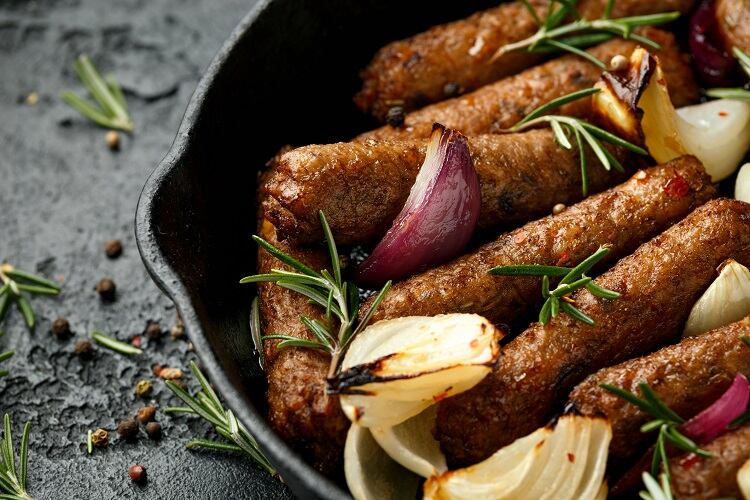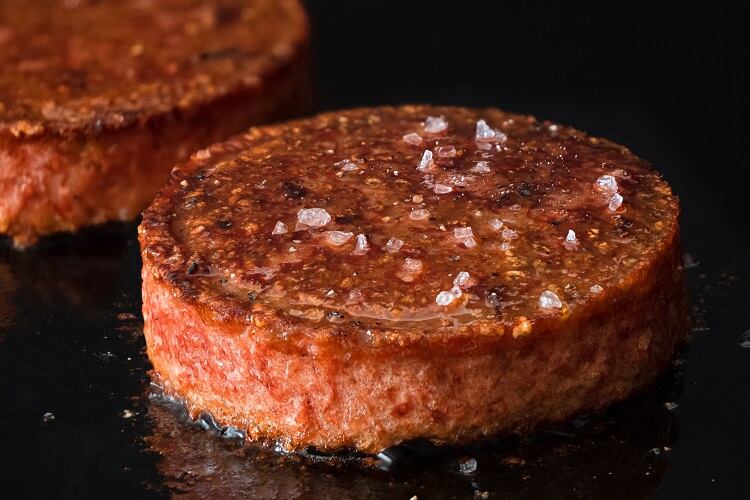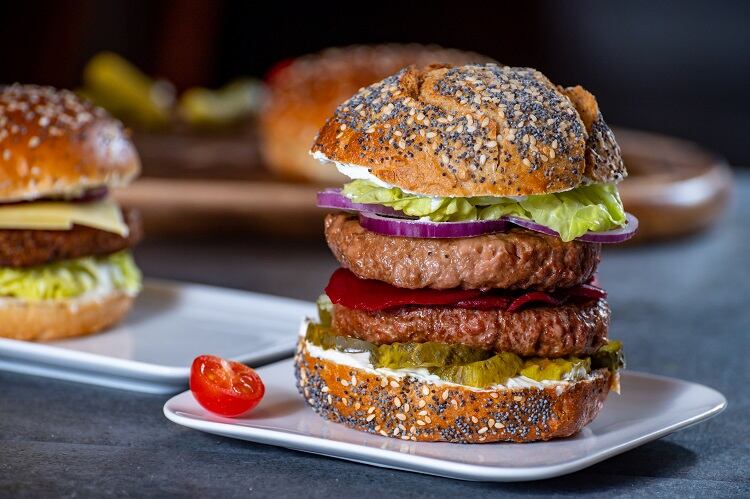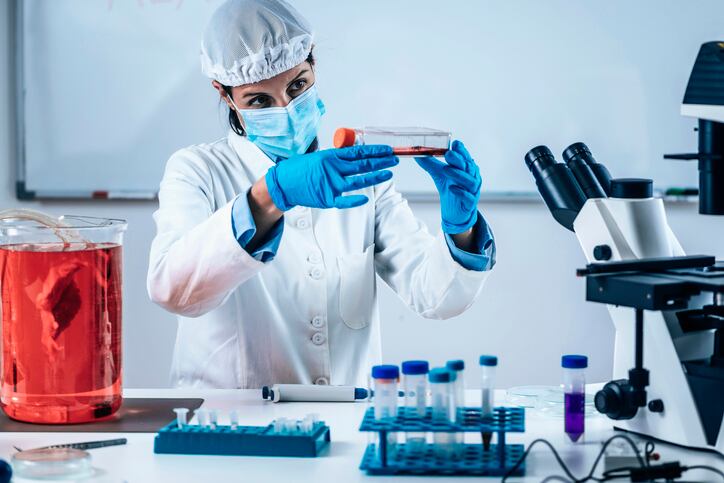The global meat market is worth some $1.3trn. The newer, plant-based meat alternative market is valued around the $4.3bn mark.
Yet despite their sizeable values, entrepreneurs Ed Steele and Dr Max Jamilly say both industries have serious flaws. “The global meat market is broken. It’s killing us, it’s killing the planet,” said Dr Jamilly.
“2020 was a great example of how global food security is at an all-time low. Food supply is fragile and traditional intensive agriculture has a big role in the spread of animal-borne disease, antibiotic resistance, and its enormous impact on climate.”
While demand for plant-based meat alternatives is ‘soaring’ – MarketsandMarkets expects the sector to be worth $8.3bn by 2025 – the duo ‘firmly believes’ that plant-based meat alternatives ‘still aren’t good enough’.
“And that’s because it is missing this one crucial ingredient, which is fat.” Dr Jamilly told FoodNavigator. “And that’s where we come in.”
The plant oil problem: ‘Nobody wants a burger that tastes of coconut’
The duo’s start-up, Hoxton Farms, makes cell-based animal fat. Its initial goal is to sell its cultivated offering to plant-based meat companies as a replacement of vegetable oil.
In doing so, industry can ‘finally’ replace plant oils and create meat alternatives that ‘look, cook and taste just as good as the real thing’, said Dr Jamilly, ‘if not better’.
So what is Hoxton Farms' beef with plant-based oils? According to the co-founder, plant-based oils can be detrimental to the environment and underperform on taste and functionality.
“People have been trying to get plant oils to perform like animal fat for over 150 years, since the French invented margarine, and we haven’t gone far beyond that in the intervening time. The problem is that plant oils are very bad for the environment – unsustainably sourced palm oil and coconut oil in particular – and they have the wrong taste,” said Dr Jamilly. “Nobody wants a burger that tastes of coconut.”

From a functionality perspective, Hoxton Farms also find plant oils lacking. “Their melting temperature is very low, which means that if the fat hasn’t melted out of the product on the supermarket shelves, then it definitely does when you put it in the pan or the oven,” the co-founder continued.
This can result in a greasy, rather than juicy, sensation. “And that’s not to mention the health impact of plant oils, and the fact that to cover up their taste, plant-based meat contains a huge amount of salt and other flavourings.”
Real animal fat ‘without the ethical or environmental hang-ups’
Hoxton Farms' response to these ‘unsatisfactory’ plant-based fats is to do somewhat of a U-turn and focus on animal fats.
“Animal fats, because of their structure and chemical properties, have a much better melting temperature which makes them really juicy. They also have a better taste, and that’s what we’re trying to deliver,” explained Dr Jamilly.
Rather than use plant oils, which the co-founder described as a ‘dodgy substitute’, Hoxton Farms suggests food makers use its cultivated animal fat. “It’s a product we know and love, and is the most important sensory component of the meat we eat.
“But we’re producing it with none of the ethical or environmental hang-ups of traditional meat.”
Hoxton Farms' first product is a versatile cultured fat intended for a variety of products. What is particularly exciting about the technology, fellow co-founder Steele explained, is its ability to meet customisation demands.
“By feeding the fat cells something different, we can get them to essentially create different fats inside the cells. This means that we end up with different flavours and taste compositions, for example, or different nutritional profiles, densities, and melting properties – all of which are really important to plant-based meat companies.”
Therefore, the start-up plans not only to make one versatile type of fat, but also bespoke and customised fats for its partners, produced with their product and manufacturing technique in mind.
Blending computational biology with bioreactors
While Hoxton Farms is still a relatively new business, the co-founders have known each other for 25 years. In fact, the duo met each other at nursery school.
Dr Jamilly has a background in synthetic biology, whereas Steele’s expertise lies in mathematical modelling and machine learning. The friends are combining their talents to bring an ‘incredible solution’ to an ‘urgent problem in fat’.

The fat-making process beings with a handful of cells sourced from an animal. While Dr Jamilly did not reveal precisely which animals the start-up is working with, he did say that once those cells are harvested, the animal ‘carries on running happily around the field’. “We take some cells and store them in a freezer so that we never have to go back and bother the animal again.”
Those cells are then placed into a bioreactor to grow. By ‘flicking a switch’, the duo encourages the cells to turn into fat cells, he continued. Once they are matured, the fat tissue is harvested.
Concerning growth media, Dr Jamilly revealed Hoxton Farms makes its own, stressing that the entire process in animal free.
What is particularly unique about the start-up’s process, is how the co-founders blend their expertise. “A huge part of what sets us apart is the ability to use really good computational modelling to make the entire process a lot more cost effective. A lot of that comes down to redesigning and optimising the media that we grow the cells in,” Dr Jamilly explained.
In a traditional, multi-step biological process, lab experiments serve to optimise the first step. “However, a scientist may find themselves halfway through the second step before realising they’ve broken the first step and have to start over,” said the co-founder.
Hoxton Farms’ approach is more time-efficient and less costly, we were told. “We build computational models of the entire process, which means we can optimise it at the touch of a button in the computer, instead of having to spend huge amounts of time and resources doing these experiments in the lab.”
Computational modelling will also help the business scale quickly. Hoxton Farms can apply its ‘computational advantage’ to the downstream sides of the process, we were told, such as modelling the fluid dynamics inside the bioreactor, or the physical forces experienced by the cells.
“A big part of that is having really good scale down models, so that without having to go to 10,000L, we can understand what 10,000L will be like in a much smaller reactor that fits inside our lab,” explained Dr Jamilly.
Is cultivated fat healthy and sustainable?
While fat’s name has been dragged through the mud in recent times – think back to the low-fat craze that infiltrated multiple categories, including dairy – today the nutrient is not as unpopular as it once was.
“Fat has an unfortunate reputation from a nutrition point of view, which has probably changed quite a bit in the last couple of years with diets such as keto and others,” explained Steele.
That said, Hoxton Farms believes its cultured fat can be more nutritious than the real thing, thanks to its customisation capabilities. “We can essentially change the fatty acid composition to encourage better saturated vs unsaturated fat ratios,” he explained. “We can even introduce Omega-3 fatty acids – which are usually only found in fish and algae – into our meat fat as well.”
From a sustainability standpoint, the start-up says its technology is more environmentally friendly for a number of reasons. To start with, if Hoxton Farms’ cultivated fat is replacing palm oil in plant-based meat alternatives, for example, it can be assured it has not contributed to deforestation in tropical climates, said Steele.
The co-founder also pointed to a 2019 Oxford University study entitled ‘Climate Impacts of Cultured Meat and Beef Cattle’, published in Frontiers, in which researchers found that cattle systems are associated with the production of carbon dioxide, methane, and nitrous oxide. Cultured meat emissions, on the other hand, are associated with almost entirely carbon dioxide from energy consumption.
“We are confident that we can reduce the energy impact of the bioreactors we use through our computational and mathematical optimisation,” said Steele.
Commercialisation challenges and opportunities
Mathematical and computational modelling will not just enable Hoxton Farms to optimise its process, but it will allow the start-up to ‘massively’ reduce its costs.
So how much will cultured meat cost manufacturers? Without giving too much away, Dr Jamilly said this question can be looked at in two distinct ways. The first is the cost of its cultivated fat, which “needs to be at, or close to, price parity with the more premium plant oils on the market – such as shea butter and cocoa butter”.
Secondly, the price question relates to the plant-based meat alternative products that use Hoxton Farms’ fat. “We’ll be selling it to plant-based meat companies, who are replacing not just the plant oils, but also a host of other flavourings, salt, and other ingredients.
“We need to make sure that their cost of goods doesn’t increase by introducing our fat. In fact, we’re confident that we can reduce their costs by introducing our cultivated fat, due to its functionality.”
While for starters, Hoxton Farms is targeting the plant-based meat alternative market, in the future it hopes to help improve functionality in a variety of categories, from alt dairy to bakery and confectionery.

Concerning regulation, the start-up has hopes for a number of geographies. The US Food and Drink Federation (FDA) has started to implement frameworks that could approve different part of the cultivated fat process, and Singapore’s recent approval of a cultivated chicken ingredient is ‘really encouraging’, said Steele.
To be authorised in Europe, Hoxton Farms would have to seek approval as a novel food. It is possible that the UK’s departure from the EU offers more possibilities, suggested Steele. “Brexit has given regulators in the UK a license to explore, using regulation as a tool for getting products to market and improving innovation in the UK.
“It’s possible that things will be approved in the UK earlier than they might otherwise be elsewhere in Europe. We’ll see what happens there. We’re speaking to regulators, in particular in the UK and Europe. We’re really pushing forward as much as we possibly can.”
Hoxton Farms recently closed a £2.7m seed funding round led by Founders Fund, alongside Backed, Presight Capital, CPT Capital, and Sustainable Food Ventures. The investment will help the start-up develop its production platform and build out its research and development team.
“We’re in the middle of a big hiring push. We are hiring computational biologists, tissue culture scientists, and bioprocess engineers,” said Steele. “We’re really excited to push on the R&D we’re doing.”



